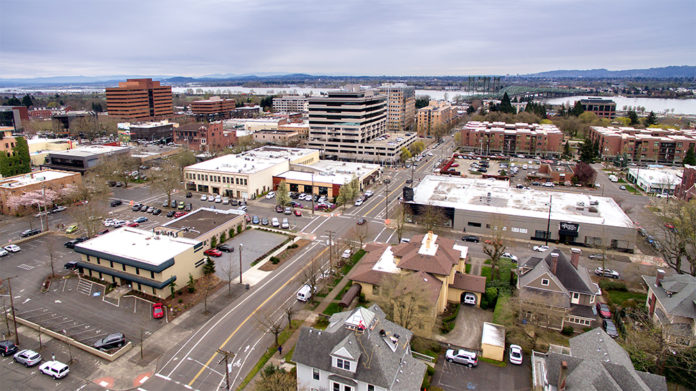Recently signed by Gov. Jay Inslee, Senate Bill 5336 will continue to support local businesses in Vancouver by clarifying population requirements for eligibility to participate in the Washington State Main Street Program. This program helps communities revitalize their economies and appearance through approaches built around their unique heritages and attributes, according to a news release from Sen. Annette Cleveland’s (D-Vancouver) office. Cleveland was one of the senators who spearheaded the bill.
Michael Walker, executive director of Vancouver’s Downtown Association (VDA), said the Washington Main Street Program was codified in 2005 and, shortly after, Vancouver applied and was accepted into the program providing both the framework and funding through a Main Street Tax Incentive Program to help fund revitalization activities.
When the Washington Main Street Program was enacted, Walker said there was a population cap set prohibiting communities with a population of 190,000 or larger from joining. At that point in time, the city of Vancouver had a population of approximately 157,000.
“The original law was unclear on whether Main Street designations could be stripped once a community passed the 190,000 population threshold, or if the population criteria only applied to communities at time of designation,” Walker said. “Vancouver was the first community in the state to face this conundrum, and its status as a designated Main Street Program was threatened with the release of the 2020 census pegging Vancouver’s population at 196,500.”
Senate Bill 5336 clarified the language in the law to “at time of designation.” This allows Vancouver to retain its status in the Main Street Program, as the community was designated in 2005 with a population of 157,000. Without the passage of this bill, Walker said that Vancouver would have lost its designation in the Washington Main Street Program and, as a result, the designated organization – VDA – would have lost its ability to access critical funding through the Main Street Tax Incentive Program.
“The Main Street Tax Incentive Program is a powerful funding tool that allows businesses to redirect a portion of their Business & Occupation Tax liability to the Vancouver’s Downtown Association to help fund our critical revitalization efforts that create an attractive employment center, increase visitation to our small businesses and enhance the quality of life for our residents,” Walker said. “Business that pledge to the program receive a 75% credit on their upcoming B&O tax bill, for example, if a business donates $1,000 to VDA through the program, they will receive a $750 credit on their upcoming annual liability and the remaining $250 is a tax-deductible donation due to our nonprofit status. This is a great way to localize tax dollars.”
Julie Arenz, small business project manager for the city of Vancouver, said that VDA has been a critical catalyst for revitalization in the downtown core for more than 32 years, and having Senate Bill 5336 confirm the city’s participation is crucial to the continued assistance and support offered to downtown businesses.
While they have seen significant change and investment along the corridor, Walker said businesses are still recovering from COVID closures, facing an inflationary environment and are adapting to companies pivoting to a hybrid model.
“Businesses in downtown Vancouver have remained resilient and continue to innovate and meet the ever-changing business environment,” Walker said.
Many of the vacant storefronts that have been seen in the downtown area have transitioned into “new and exciting businesses,” according to Walker. These new businesses include:
- 605 Main is now a new upscale bar concept by the owners of Pacific House, called Foxhole Den.
- 1001 Main transitioned from Rosemary’s Café to a new restaurant, Short & Sweet.
- 1009 Main transitioned from a print shop to a new florist, Fieldwork Flowers.
- 1017 Main is a completely new storefront that previously was sealed several decades ago. It was recently reopened and now houses a new yoga studio, Aisha House Yoga.
- 1015 Main was the old home of Niche Wine Bar, but due to business expansion the owner has transitioned to a significantly larger space on Washington Street.
- 106 E. Evergreen transitioned from Jerusalem Café to a new tiki bar concept, Coral Club.
- 809 Washington, Woody’s Tacos transitioned to new ownership and just reopened.
- 905 Main, long-time vacant space, is a new restaurant called 7 Restaurant.
- 1001 Broadway, old IV Tea location, is transitioning to a bakery.
- 114 E. Evergreen, old Trusty Brewing Company, is transitioning to a new concept.
Arenz said that, according to a recent Columbia River Economic Development Council (CREDC) presentation, Vancouver’s overall office vacancy rate is 10.4% compared to downtown Portland at 26.8%. When considering the new construction that’s occurring in downtown Vancouver, Arenz said that space is 100% leased with vacancy hovering around 5.5%.
“This is an exciting time for business owners to open their doors in downtown Vancouver,” Arenz said. “With the upcoming Main Street Promise investments and improvements, there’s no better time to secure your space on Main.”
Walker said that the passage of Senate Bill 5336 will allow for the VDA to continue its work in creating a vibrant and vital city center through a variety of holistic initiatives focused on technical assistance for the area’s small businesses, clean and safe activities to maintain downtown as an attractive district for investment, marketing to increase visitation to downtown, investments like public art and placemaking, in addition to an on-the-street presence to help filter downtown concerns into advocacy and action.
“As the Main Street Infrastructure Project moves forward, slated to begin February 2024, the VDA will play a critical role in supporting businesses with grant opportunities, technical assistance, communication and advocacy, to ensure that businesses are retained and successful post construction,” Walker said.






